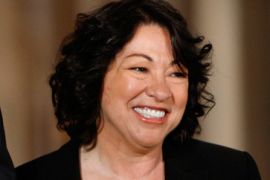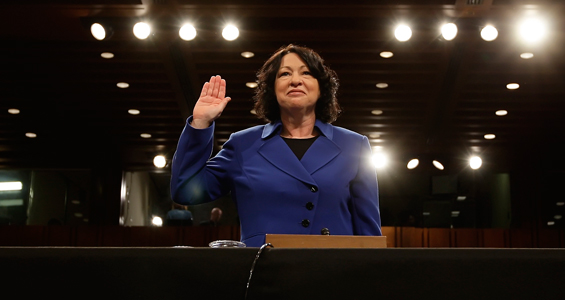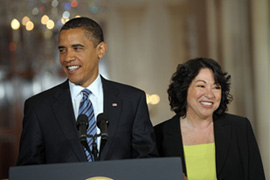Sotomayor faces own legal test
Obama’s supreme court nominee faces tough questions from confirmation panel.

 |
| If confirmed, Sotomayor will become the first Latina to serve as a US supreme court justice [EPA] |
When one of the justices of the US supreme court retired in May, Barack Obama, the US president, must have seen it as a chance to ensure that his legacy would stretch far beyond his own four-year term.
He nominated Sonia Sotomayor, a US court of appeals judge. Should she be confirmed after confirmation hearings this week, she will become the first Latina supreme court justice, in a country where 15 per cent of the population is Hispanic.
|
“Many of Judge Sotomayor’s public statements suggest that she may, indeed, allow, and even embrace, decision-making based on her biases and prejudices” Jon Kyl, Republican confirmation panel member |
Supreme court justices serve for life and, depending on what they adjudicate, can change the course of the nation.
The nine justices of the court can collectively decide on the outcome of a presidential election, as they did in 2000 when they stopped a recount of votes in Florida, thereby handing the presidency to George Bush.
The court also has the power to strike down laws passed by congress – as it did in 2008, when it ruled part of the Military Commissions Act unconstitutional, asserting that detainees at the Guantanamo Bay prison camp had the right to challenge their detention.
And the court has also been an instrument for social change. In 1954, it paved the way for the integration of blacks and whites in all public schools, ruling that the separation of students based on race was inherently unequal.
Balance of power
If confirmed by the US senate, Sotomayor will replace one of the court’s more politically liberal justices. The court is currently split evenly between liberal and conservative justices, plus one swing vote.
Sotomayor would most likely be a liberal voice, meaning that the balance of power in the court would remain the same.
She was born to Puerto Rican parents, grew up in New York, and attended one of the nation’s top law schools.
After practising law and working as a federal prosecutor, Sotomayor was appointed a federal judge in 1992.
Sotomayor will try to keep her personal politics out of the week-long confirmation hearings and try to convince the panel that she is an objective observer of US law.
Test of mettle
 |
| Obama’s choice for the court needs to convince Republicans that she can do the job [AFP] |
The 19 senators on the committee are likely to test Sotomayor with a string of questions on how she will apply the tenets of US law to hypothetical situations.
In turn, the nominee will likely try her best to head off questions from the panel aimed at uncovering her political leanings.
The senators on the committee may try to get some insight on how she will rule on abortion. As a judge, Sotomayor has never ruled on case pertaining to abortion-rights, a controversial social issue that the court frequently takes up.
The hearings are also an opportunity for Republicans and Democrats to complain about recent decisions from the supreme court that they disagree with.
And it is an opportunity for Republicans to air grievances over some of Obama’s policy decisions.
Republican scepticism
Republicans have accused Sotomayor of being a so-called “activist judge”, someone who makes policy from the bench.
Some have even accused her of being a “Latina racist”.
They point to comments she made in 2001: “I would hope that a wise Latina woman with the richness of her experiences would more often than not reach a better conclusion than a white male who hasn’t lived that life.”
During the first day of the confirmation hearing, Jon Kyl, a Republican, said: “Many of Judge Sotomayor’s public statements suggest that she may, indeed, allow, and even embrace, decision-making based on her biases and prejudices.”
She took on that criticism in the fifth minute of her testimony to the committee, saying her judicial philosophy is, “fidelity to the law. The task of a judge is not to make law but apply it”.
Democrats have praised her.
“I trust that all members of this committee here today will reject the efforts of partisans and outside pressure groups that have sought to create a caricature of Judge Sotomayor while belittling her record, her achievements and her intelligence,” Patrick Leahy, the chairman of the Judiciary Committee, said.
If, as expected, Sotomayor is approved by the Judiciary Committee, then all 100 members of the US senate will have an opportunity to vote on her nomination.
Should the panel vote in Sotomayor’s favour, Democrats have such a strong majority in the senate that her confirmation is almost assured.
Obama has said he wants Sotomayor’s confirmation to be completed by the time that the high court comes back into session in October.
The court is due to deal with cases involving the legality of audits meant to prevent an Enron-type accounting scandal, the constitutionality of a Bush administration immigration law, and whether or not life-sentences should be given for juvenile criminals.
If, as Lindsey Graham, a Republican senator, is correct in saying to Sotomayor on Monday that she will be confirmed to the supreme court barring a “complete meltdown”, the Latina judge will take part in considering those cases.